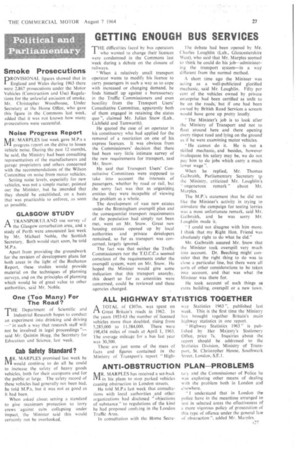GETTING ENOUGH BUS SERVICES
Page 29

If you've noticed an error in this article please click here to report it so we can fix it.
THE difficulties faced by bus operators who wanted to change their licences were condemned in the Commons last week during a debate on the closure of railways.
"When a relatively small transport operator wants to modify his licence to carry passengers in such a way as to cope with increased or changing demand, he finds himself up against a bureaucracy in the Traffic Commissioners and even hostility from the Transport Users' Consultative Committee, apparently both of them engaged in retaining the status quo ", claimed Mr. Julian Snow (Lab., Lichfield and Tamworth).
He quoted the case of an operator in his constituency who had applied for the removal of a restriction on one of his express licences. It was obvious from the Commissioners' decision that there had been very little intimate survey of the new requirements for transport, said Mr. Snow.
He said that Transport Users' Consultative Committees were supposed to take into account the interests of passengers, whether by road or rail, but the sorry fact was that as organizing entities they were incapable of viewing the problem as a whole.
The development of vast new estates under the Birmingham overspill plan and the consequential transport requirements of the population had simply not been met, went on Mr. Snow. Great new housing estates opened up by local authorities and private developers remained, so far as transport was concerned, largely ignored.
The fact was that neither the Traffic Commissioners nor the T.U.C.C.s seemed conscious of the requirements under the overspill system, went on Mr. Snow. He hoped the Minister would give some indication that this transport anarchy, this desert so far as amenities were concerned, could be reviewed and these agencies changed. The debate had been opened by Mr. Charles Loughlin (Lab., Gloucestershire West), who said that Mr. Marples seemed to think he could do his job—administering the transport system—in a way different from the normal method.
A short time ago the Minister was acting as a well-publicized glorified mechanic, said Mr. Loughlin. Fifty per cent of the vehicles owned by private enterprise had been certified as unfit to be on the roads; but if one had been owned by British Road Services a scream would have gone up pretty loudly.
" The Minister's job is to look after the Ministry of Transport and not to float around here and there opening every tinpot road and lying on the ground as if he were examining motor vehicles.
"He cannot do it. He is not a skilled mechanic, and besides, however inadequate his salary may be, we do not pay him to do jobs which carry a much lower wage ".
When he replied, Mr. Thomas Galbraith, Parliamentary Secretary tp the Ministry, criticized Mr. Loughlin's "ungenerous remark" about Mr. M a roles.
The M.P.'s statement that he did not like the Minister's activity in trying to stimulate the campaign for testing lorries was a most unfortunate remark, said Mr. Galbraith, and he was sorry Mr. Loughlin made it.
" I could not disagree with him more. I think that my Right Hon. Friend was absolutely right to do what he did."
Mr. Galbraith assured Mr. Snow that the Minister took overspill very much into account. Dr. Beeching might consider that the right thing to do was to close a particular line, but there were all sorts of other considerations to be taken into account, and that was what the Minister was there for.
He took account of such things as extra building,. overspill or a new town. •
























































































































